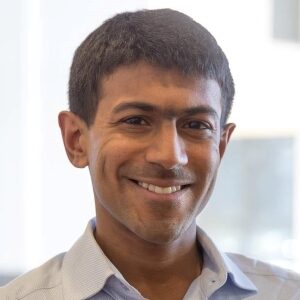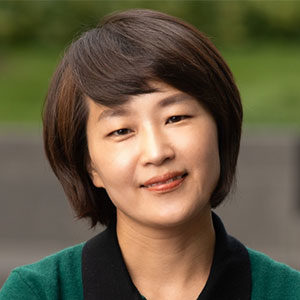It’s graduation season at Rutgers, and students are celebrating – as well as fielding questions from family, friends, and others about what they’re going to do next.
Whether they answer with confidence or uncertainty, the reality for those interested in global health is that the path to such a career is rarely a straight one. This isn’t surprising, given the breadth and complexity of the field. Over time, as individuals are exposed to the myriad aspects of global health, their goals may expand or change entirely.
So it was with two core faculty members at Rutgers Global Health Institute, Hari Iyer and Woojin Jung, who reflected on their own professional journeys since their college days. Their career paths toward roles focused on improving the health and well-being of populations in need involved unexpected turns, loops, and the occasional switchback, some of which are highlighted here.
From Finding Public Health to Finding Out What Works to Prevent Cancer
Epidemiologist Hari Iyer had considered a career as a medical doctor. Now he’s leading the Precision Prevention of Prostate Cancer Laboratory at Rutgers Cancer Institute of New Jersey, where he also is an assistant professor of cancer epidemiology and health outcomes.
 When he was an undergraduate biology major at Dartmouth, Hari Iyer didn’t know that public health “was even a thing,” he says. “I didn’t have a sense of what careers were out there in health, so medicine seemed like an obvious choice.”
When he was an undergraduate biology major at Dartmouth, Hari Iyer didn’t know that public health “was even a thing,” he says. “I didn’t have a sense of what careers were out there in health, so medicine seemed like an obvious choice.”
As Iyer learned more about the field of public health, he was excited to discover that career possibilities were virtually endless. “Oh gosh,” Iyer remembers thinking, “it’s like pick your own adventure: I can choose what interests me, and that includes switching to different topics if I realize something isn’t a good fit for me.”
After getting his master’s degree in public health, he worked in Zambia for the Boston University School of Public Health, studying the costs and outcomes of different models for antiretroviral HIV therapies. It was there that he realized you could study health in the context of program outcomes – determining which public health interventions work and which don’t – and decided that’s what he wanted to do.
His next role was in Rwanda, working with the nonprofit Partners in Health, which was supporting the Rwandan government in establishing cancer hospitals in remote areas of the country. He began to learn about cancer epidemiology – studying cancer not in individuals but in populations – and was fascinated by the concept. “Maybe,” he says he remembers thinking, “this is an area I could contribute to over the course of my career.”
He pursued a doctorate in the subject and became increasingly interested in spatial analysis, which he describes as the intersection of geography and disease. Prostate cancer intrigued him because, at the time, environmental and socioeconomic factors were thought to play a strong role in the burden of negative outcomes for African-American men, but few studies had demonstrated this.
At Rutgers, Iyer is putting all those passions to work, researching how neighborhood environments influence access to screening for prostate cancer and contribute to racially disparate outcomes. His work draws from medicine, social science, and statistics to inform public health policy.
Though he previously had been unaware of the existence of public health as a professional discipline, he’s now poised to make a lasting mark in the field – and on a large swath of the population, as well.
Different Experiences Influence Career Related to Data and Development
Woojin Jung’s professional journey introduced her to opportunities involving data science, global poverty, and international aid policy. She’s currently an assistant professor in the School of Social Work at Rutgers, and the broad aim of her research is to inform anti-poverty interventions.
 Originally from South Korea, Woojin Jung graduated from Seoul’s Ewha Womans University with a degree in social welfare and psychology. She says that, at the time, her goal was “to work for vulnerable populations.” But a job at a nonprofit organization didn’t satisfy her for long. “I wanted to find out why people fall into poverty and how government policies can lift them out of it,” she says.
Originally from South Korea, Woojin Jung graduated from Seoul’s Ewha Womans University with a degree in social welfare and psychology. She says that, at the time, her goal was “to work for vulnerable populations.” But a job at a nonprofit organization didn’t satisfy her for long. “I wanted to find out why people fall into poverty and how government policies can lift them out of it,” she says.
She had a powerful personal interest in the subject. When Jung was a child, her own family had fallen prey to a scammer and descended into financial distress, but loopholes in government policy kept them from receiving aid.
As part of her quest to understand dimensions of poverty, she pursued a master’s degree in social work and conducted fieldwork in sub-Saharan Africa, researching the roots of the region’s extreme poverty and potential government responses.
At a subsequent job as a public relations and fundraising officer at a community center in Washington, D.C., she found herself yearning to work again at something with an international impact. She chose to return to graduate school to study public policy, which led to a job as a data analyst at UNICEF. Data, it turns out, would become an essential part of her professional calling. To gain experience with more sophisticated data tools, she entered a doctoral program at University of California, Berkeley, that combines the social sciences and STEM disciplines (science, technology, engineering, and math).
At Rutgers, she’s drawing on her mastery of both to develop a computer vision algorithm with Microsoft and Massachusetts Institute of Technology (MIT), using artificial intelligence and machine learning to create a better tool to identify and predict spatial determinants of poverty. Some of this work was funded by a Global Health Seed Grant from Rutgers Global Health Institute, and she’s especially proud that it will have real-world applications.
“The paper I’m working on won’t just sit on a shelf,” she says. “Instead, it will be shared with the governments of developing countries like Zambia and the Republic of the Congo to help them prioritize social safety net programs for the neediest of their residents.”
As she’d hoped as an undergraduate, she is very much working with vulnerable populations, and the potential of her impact is far broader than she’d ever envisioned.
– Leslie Garisto Pfaff

